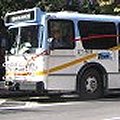- By Patty Poist
- News
 Print
Print  The TCAT Board of Directors at its regularly scheduled meeting Thurs, March 24, agreed to an emergency measure directing staff to seek public input on proposed service cuts for the agency's summer service period, which begins May 22 and ends Aug. 20.
The TCAT Board of Directors at its regularly scheduled meeting Thurs, March 24, agreed to an emergency measure directing staff to seek public input on proposed service cuts for the agency's summer service period, which begins May 22 and ends Aug. 20.TCAT normally reduces service in the summer as most college students, many of whom are TCAT riders, leave the area for summer break. Nonetheless, TCAT is considering making additional cuts this summer to level with the number of drivers it has to fulfill service.
In an emergency meeting earlier in the day Thurs., March 24, the board's Transit Services Committee examined a number of scenarios created by TCAT's Service Development and Operations team and recommended cutting some trips on Routes 10, 11, 14, 15, 20, 21,22, 31,32, 36, 37, 41, 51,52,65, 81,82, 90, 93. For specific proposed cuts, see attached. TCAT is asking passengers to go to www.tcatbus.com and click on news section on home page; or call TCAT at 607-277-7433 (RIDE), press No. 3, to leave comments or to ask TCAT to mail information regarding proposed cuts via U.S. Postal Service.
To gather input, TCAT is planning public information sessions. Two are scheduled at the Borg Warner East room in the Tompkins County Public Library, 101 E. Green St., Ithaca, from noon to 2 p.m. and again 5:30 p.m. to 7:30 p.m. on Tuesday, April 5, to collect feedback. Additional public information sessions at Cornell University, which makes up about 70 percent of TCAT's ridership during the academic year and more than 50 percent over the summer, are being planned as well. Information about these sessions will be posted in the near future on TCAT's web site and via Cornell information outlets.
"We have to face a new reality that we cannot promise or advertise a service we cannot fulfill," said TCAT Acting General Manager Alice Eccleston "Passengers need reliability and our bus operators, who work long, nontraditional hours, need their time off as anyone else who holds a job. As painful as service reductions are to our community, being unreliable to our passengers and driver burnout are even worse."
Since last fall, TCAT has ramped up recruitment efforts with outreach, but given the tight labor market especially for commercial drivers, has been unsuccessful at bringing staffing to optimal levels. TCAT has 70 bus operators on staff and needs 82 to sustain current service even in the non-academic part of the year when service is reduced as bus operators plan their vacations. Since November, TCAT has used contract drivers to fill gaps, but only as a short-term measure. TCAT's budget cannot sustain the high cost of using contract workers as a long-term solution. Nonetheless, that option is still on the table for summer service, though some board members, including TCAT Board Chairman Bill Gray, expressed concern that it would be too costly to justify the additional expense for contract drivers, which is about $33,000 per week.
"Using costly contract workers over the summer to fill gaps could be just delaying the inevitable," said TCAT Board Member Bridgette Brady, who serves as TCAT's Service Committee Chairperson. "Whatever we do, we will use all avenues available to communicate with our passengers as far in advance as possible."
TCAT Service Analyst Matt Yarrow, TCAT's Operations Manager Nancy Oltz, and TCAT Dispatchers Ray Davis and Jerry Anderson huddled in recent days to work on a number of scenarios to trim service with the least impact on passengers and to do so equitably so that no one demographic suffers more than another. "We don't want to inconvenience people more than we have to," Yarrow said.
For several years, TCAT has tried to tailor its service to the available resources, both human and financial. "Unfortunately, there is very little fat left to adjust service without making deeper, more painful cuts," said long-time TCAT Board Member Jennifer Dotson, a member of the Transit Service Committee.
TCAT is also contending with other issues and recently had a spate of missed trips due to bus shortages, which has been partly remedied by the acquisition of five new replacement buses. An aging fleet, which results in bus breakdowns and expensive mechanical repairs, has also been detrimental to service. (In recent months, TCAT has also been contending with shortages of mechanics and, fortunately, has been able to fill most of those vacancies.)
Meantime, TCAT is continuing its recruitment efforts and advocacy, particularly now at the state level for better funding models, especially to address a lack of predictable and adequate funding for capital needs, such as much-needed bus replacements. "We are doing our very best to contend with these intense pressures, from bus operator shortages to a lack of adequate funding," Eccleston said.
Eccleston added: "Though a reduction in summer service is considered a temporary action, we cannot promise we will not be forced to make cuts for fall service as well, and we will strive to inform the community so that they can plan for their travel needs."
TCAT Board Member John C. Gutenberger said: "TCAT is a nationally recognized, award-winning public transit service provider. It is the goal of the TCAT board and staff to maintain this record of excellence, even in light of these difficult financial and operational realities."
v12i13



